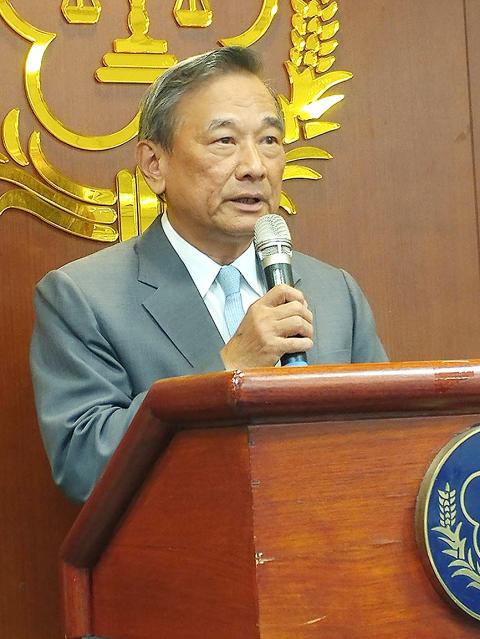Convicted murderer Lee Hung-chi (李宏基), who killed his ex-wife and their six-year-old daughter, was yesterday afternoon executed by shooting in Kaohsiung.
It was the first execution sanctioned by Minister of Justice Tsai Ching-hsiang (蔡清祥) — 46 days since he took office on July 16 — and the first under the administration of President Tsai Ing-wen (蔡英文) since she assumed the presidency on May 20, 2016.
Officials said 39-year-old Lee was informed of the Ministry of Justice’s approval to carry out the order earlier in the day before he was taken to the execution ground at Kaohsiung Second Prison, where he was shot in the heart from behind at 3:37pm.

Photo: CNA
In addition to the executioner, the process was watched by prosecutors, a coroner, the prison warden and security guards, Deputy Minister of Justice Chen Ming-tang (陳明堂) said in Taipei.
“Afterward, the body was examined and the coroner made the official announcement certifying Lee’s death at 4:01pm,” Chen said.
Lee and his ex-wife, surnamed Chen (陳), had two daughters. She had filed for a restraining order following domestic violence incidents and later filed for divorce, gaining custody of their two daughters.
On April 16, 2014, Lee waited for his ex-wife at the kindergarten their daughters attended, where he stabbed her to death with a kitchen knife before taking his eldest daughter and driving to the mountains in Hsinchu County.
Lee fed his daughter sleeping pills and then tried to commit suicide by burning charcoal in the car.
They were found unconscious the next day and rushed to a local hospital. Despite the efforts of medical personnel, his daughter died one month later.
Judges rejected an appeal and handed Lee the death sentence, citing his lack of remorse and his vowing in court to complete “unfinished business” and to take revenge on his ex-wife’s family if he were to get out of prison.
Tsai said the ministry assessed the case with the highest prudence and applied the strictest criteria in reviewing and approving the execution warrant.
According to prison officials, when asked for his last words, Lee at first said he did not have any, but later said he felt sorry for his family.
Lee seemed ready to accept his fate and did not eat much of his last meal before requesting to smoke one last cigarette, prison officials said, adding that he walked to the execution ground without the assistance of security personnel.
Members of the Taiwan Alliance to End the Death Penalty held a protest following news of Lee’s execution, saying that it was a step backward for human rights in Taiwan.
Other human rights advocates asked if the government was trying to show the public that it was carrying out justice in the run-up to the Nov. 24 nine-in-one elections, saying that no nation should use the death penalty to score political points.
Carrying out executions would not solve society’s problems, they added.
Additional reporting by Chang Wen-chuan

The CIA has a message for Chinese government officials worried about their place in Chinese President Xi Jinping’s (習近平) government: Come work with us. The agency released two Mandarin-language videos on social media on Thursday inviting disgruntled officials to contact the CIA. The recruitment videos posted on YouTube and X racked up more than 5 million views combined in their first day. The outreach comes as CIA Director John Ratcliffe has vowed to boost the agency’s use of intelligence from human sources and its focus on China, which has recently targeted US officials with its own espionage operations. The videos are “aimed at

STEADFAST FRIEND: The bills encourage increased Taiwan-US engagement and address China’s distortion of UN Resolution 2758 to isolate Taiwan internationally The Presidential Office yesterday thanked the US House of Representatives for unanimously passing two Taiwan-related bills highlighting its solid support for Taiwan’s democracy and global participation, and for deepening bilateral relations. One of the bills, the Taiwan Assurance Implementation Act, requires the US Department of State to periodically review its guidelines for engagement with Taiwan, and report to the US Congress on the guidelines and plans to lift self-imposed limitations on US-Taiwan engagement. The other bill is the Taiwan International Solidarity Act, which clarifies that UN Resolution 2758 does not address the issue of the representation of Taiwan or its people in

SHIFT: Taiwan’s better-than-expected first-quarter GDP and signs of weakness in the US have driven global capital back to emerging markets, the central bank head said The central bank yesterday blamed market speculation for the steep rise in the local currency, and urged exporters and financial institutions to stay calm and stop panic sell-offs to avoid hurting their own profitability. The nation’s top monetary policymaker said that it would step in, if necessary, to maintain order and stability in the foreign exchange market. The remarks came as the NT dollar yesterday closed up NT$0.919 to NT$30.145 against the US dollar in Taipei trading, after rising as high as NT$29.59 in intraday trading. The local currency has surged 5.85 percent against the greenback over the past two sessions, central

US Indo-Pacific Commander Admiral Samuel Paparo on Friday expressed concern over the rate at which China is diversifying its military exercises, the Financial Times (FT) reported on Saturday. “The rates of change on the depth and breadth of their exercises is the one non-linear effect that I’ve seen in the last year that wakes me up at night or keeps me up at night,” Paparo was quoted by FT as saying while attending the annual Sedona Forum at the McCain Institute in Arizona. Paparo also expressed concern over the speed with which China was expanding its military. While the US